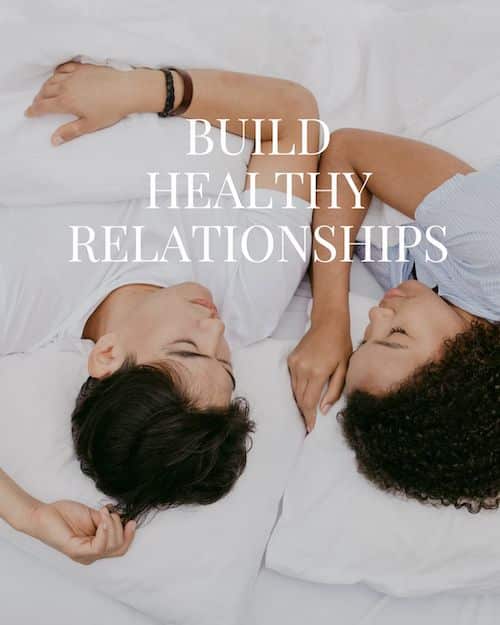The Hidden Key to Health: Your Relationships

Your Relationships Impact Your Health
July is National Relationships Month and Reminds Us True Health Includes Connection
When we think about health, most of us immediately think of nutrition, exercise, sleep, and stress. But there’s a crucial factor that is too often overlooked: relationships.
July is National Relationships Month and a time to reflect on how our relationships deeply impact every aspect of our well-being, from how well we sleep, to how we digest, even down to how we methylate (and age!).
Harvard University’s 85-year-long Harvard Study of Adult Development has revealed that the quality of our relationships is the strongest predictor of long-term health and happiness; more than cholesterol levels or genetics.
In fact, close relationships were found to delay mental and physical decline and are better predictors of long, happy lives than social class, IQ, or even genes.
Let’s learn a bit more about what aspects of health our relationships impact–and how to strengthen our relationships!
Gut Health
It might surprise you, but your relationship health can directly impact your gut health. The gut-brain axis, the bidirectional communication system between your gastrointestinal tract and your brain, is heavily influenced by your emotional state and relational stability.
Chronic relational stress can lead to:
Impaired digestion and bloating
Leaky gut syndrome, which increases systemic inflammation
Altered microbiome diversity, leading to immune dysregulation
These effects are often subtle at first but can snowball into long-term digestive and metabolic challenges.


Anxiety and Stress Response
Relationships are key regulators of the nervous system, especially the hypothalamic-pituitary-adrenal (HPA) axis, which governs your body’s response to stress. Supportive interactions can downregulate this system, reducing levels of cortisol, the primary stress hormone.
On the flip side, chronic relational tension, loneliness, or conflict can lead to prolonged HPA activation, which keeps the body in a low-grade “fight or flight” state.
Over time, this constant stress response contributes to:
Anxiety and panic symptoms
Brain fog and memory lapses
Hormonal imbalances, particularly adrenal fatigue
Compromised immune defense
The Harvard Study of Adult Development confirms that warm, emotionally secure relationships help modulate stress responses, buffering the brain and body against wear and tear.

Sleep and Circadian Health
The health of your relationships can significantly influence how well you fall asleep, stay asleep, and feel restored upon waking. Emotional security promotes parasympathetic nervous system activation, the branch responsible for rest and recovery.
Research shows that individuals in secure, connected relationships experience:
Fewer episodes of insomnia
Higher-quality deep sleep (slow-wave sleep)
Less nighttime cortisol release, which can otherwise cause middle-of-the-night wake-ups
Reduced sleep latency — the time it takes to fall asleep
Relational tension or loneliness can trigger hypervigilance at night, often leading to light, fragmented sleep or chronic insomnia — even when sleep hygiene is perfect.
Your Cardiovascular System
Love and connection are potent cardioprotective agents. Supportive social bonds have been associated with:
Lower resting heart rate and blood pressure
Decreased systemic inflammation (a root cause of atherosclerosis)
Healthier heart rate variability (HRV), a marker of resilience and recovery
One landmark study showed that people in satisfying marriages had lower risk of heart attacks, even when accounting for other lifestyle factors. In contrast, ongoing relational conflict is a known contributor to hypertension, coronary artery disease, and increased risk of stroke.
Feeling emotionally “safe” allows your cardiovascular system to downshift and recover. That sense of calm isn’t just psychological — it’s measurable in your physiology.


Methylation and Aging
Methylation is impact by your environment and relationships. It’s a biochemical process that affects how your body detoxifies, repairs DNA, and turns genes on or off. It’s essential for neurotransmitter synthesis, hormone balance, and immune regulation.
Emerging research from MIT and Harvard Medical School shows that chronic psychological stress and social conflict can cause measurable changes in DNA methylation patterns, which:
Influence your risk of developing anxiety or depression
Alter your immune surveillance and autoimmunity risk
Impair your ability to detoxify environmental toxins and estrogens
Your relational world shapes your genetic expression and turns health-promoting genes on or off depending on your emotional safety and connectedness.
Your Immune System
The immune system is deeply influenced by your emotional landscape.
Studies show that loneliness and chronic interpersonal stress are linked to elevated pro-inflammatory cytokines, leaving the body more vulnerable to infection, chronic illness, and autoimmune conditions.
In contrast, positive relational experiences help regulate inflammation and increase:
Production of natural killer cells, which fight viruses and cancer
Expression of anti-inflammatory genes
Speed of wound healing — shown to be significantly faster in people who feel supported
In one study, caregivers under chronic emotional stress healed skin wounds nearly 9 days slower than non-caregivers — a tangible example of how our social context impacts immune resilience.


Building Healthy Relationships
Improving your relationships relies on how you engage.
Practice reflective listening: Instead of planning your next response, slow down and repeat back what you hear. “What I’m hearing is…” helps others feel seen and fosters emotional safety.
Set clear boundaries with kindness: Boundaries are not walls—they’re guidelines for mutual respect. Use “I” statements (e.g., “I need some time to recharge before continuing this conversation”) rather than blame.
Schedule regular connection: Just as you prioritize workouts or supplements, block out time for nourishing conversations and shared activities with loved ones.
Repair after rupture: Conflict is inevitable. What matters most is how you repair. A sincere apology and a willingness to grow can actually deepen intimacy.
Learn your attachment style (see below): Understanding and honoring each other’s needs, emotional wiring, and pre-disposed belief systems help us approach communication and boundaries in ways that work for our partners.

Attachment Style & Health
Why do some people thrive in close relationships, while others struggle with intimacy, trust, or conflict? The answer may lie in your attachment style—a psychological framework developed in early childhood that shapes how you relate to others in adulthood.
Secure attachment is associated with emotional resilience, lower levels of stress, and better health outcomes.
Anxious or avoidant attachment styles, on the other hand, have been linked to higher cortisol levels, increased inflammation, poor immune response, and even digestive disorders.
Studies from Columbia University and UCLA have shown that individuals with insecure attachment styles are more likely to experience sleep disturbances, cardiovascular stress, and digestive dysregulation, driven by chronically elevated sympathetic nervous system activation.
Understanding your attachment style is a powerful tool for health and self-awareness. It can help you identify where you may need to communicate more clearly, set firmer boundaries, or ask for support more effectively.
Your Relationships Checklist
As we honor National Relationships Month, ask yourself:
Do I feel emotionally supported by at least one person?
Do I prioritize time for connection as much as I do my gym sessions?
Am I holding on to unresolved relational wounds or attachment patterns that might be impacting my health?
At Rêve Health, we believe that true health is multidimensional, and your relationships are a key part of your health picture. That’s why we include relational well-being and attachment styles in our personalized health reports.
Join us for an upcoming webinar July 16, 2025 at 5pm PT on strengthening your relationships, identifying attachment styles, and ways to set boundaries.


